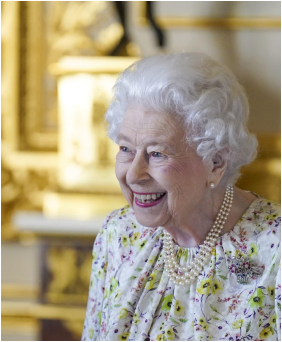Queen Elizabeth’s legacy of wisdom, humility, and leadership

Queen Elizabeth II at Windsor Castle
September 22, 2022
Queen Elizabeth II appeared on the cover of Time magazine in 1929 at three years old. Nobody could’ve envisioned she would become the world longest reigning female monarch, or even Queen, for that matter. At her birth, she was third in line for the throne after her uncle Edward VIII and her father George VI. Edward didn’t have any children but was expected to, and they would have pushed Elizabeth further down the line of succession. In 1936 Edward announced that he would abdicate the throne to marry twice-divorced American Wallis Simpson. At the time, the Church of England (of which the monarch is the Supreme Governor) prohibited divorced people from remarrying if their spouse was still alive. After Edward became the first British monarch to voluntarily abdicate the throne, Elizabeth’s father, George VI, became King. Fifteen years later, she would become Queen.
Queen Elizabeth II had the opportunity to wield enormous power throughout her reign. Yet, she chose not to, instead allowing much of it to be stripped away entirely. A notable example is that prior to 2011, the monarch could dissolve parliament and call for new elections whenever they wished. These early elections were granted using the Queen’s royal prerogative at the request of the Prime Minister. In 2011 the Fixed-Term Parliaments Act stated that parliamentary elections would be held five years after the most recent general elections and removed the monarch’s royal prerogative to call them. The FTPA passed both houses of parliament, and like all bills, it needed to be approved via the Queen’s ‘royal assent’ before becoming law. It is worth noting that Queen Elizabeth had never refused to grant royal assent, as to do so would be to go against the wishes of her people.
The Queen was served by 15 prime ministers, beginning with Winston Churchill and later the first three women to hold the office, including Liz Truss, who, after winning her party’s election, was appointed by the Queen on September 6.
Despite being the most traveled head of state and instantly recognizable, appearing on 300 billion stamps and all currency in dozens of countries, she was never interested in fame. She stayed true to herself and her words on the radio on her 21st birthday: “I declare before you all that my whole life, whether it be long or short, shall be devoted to your service, and the service of our great imperial family to which we all belong.”
As word of the Queen’s passing spread around the world, hundreds of millions mourned her. However, some saw her death as a cause for celebration; some felt that her legacy was not of generosity and peace but of cruelty and oppression stemming from the British Empire colonizing nearly 1/4th of Earth’s land area. President of the Saint Anselm College International Relations club Patrick Marcoux noted that the Queen “oversaw nothing but decolonization.” This is unequivocally true as nearly 50 former British colonies became independent during her reign. Marcoux argued that those who wish “to hold her responsible for controversial actions that happened before (or during) her reign by a duly elected body are ignorant of the fundamental tenets of the British constitutional monarchy.”
Queen Elizabeth II was lying-in-state at Westminster hall until Sunday, September 18. The week prior, people from all over the world had gotten in a miles-long queue to pay their respects. Some people reportedly waited as long as 30 hours before being able to enter the nearly 1,000-year-old building. On Monday, September 19, a funeral service was held, and she was laid to rest at King George VI Memorial Chapel alongside her late husband, Prince Phillip.
Her eldest son Charles III had been heir apparent since age three, and at 73, he is the oldest person to assume the throne. His coronation ceremony isn’t likely to take place until 2023. Factors such as his low popularity compared to his mother (or his son and heir apparent, Prince William), his old age (and potential brief reign), and personal preference make it likely that it will not be nearly the celebration Elizabeth had when she was 25. Additionally, debates over whether Charles should immediately abdicate upon ascension to the throne have been going on for years.
When asked, many Saint Anselm students felt that it would not be in the best interest of the monarchy for King Charles to reign until his death. Mac Connors, a noted monarchist and Senator serving the class of 2025, disagreed, pointing out that expecting Charles to abdicate due to his age and lower popularity than William “would set a bad precedent.” Some, even including those in the UK and the rest of the Commonwealth, question the relevance of the British monarchy as a whole, but everyone interviewed for this piece expects the monarchy to continue well into the future.


